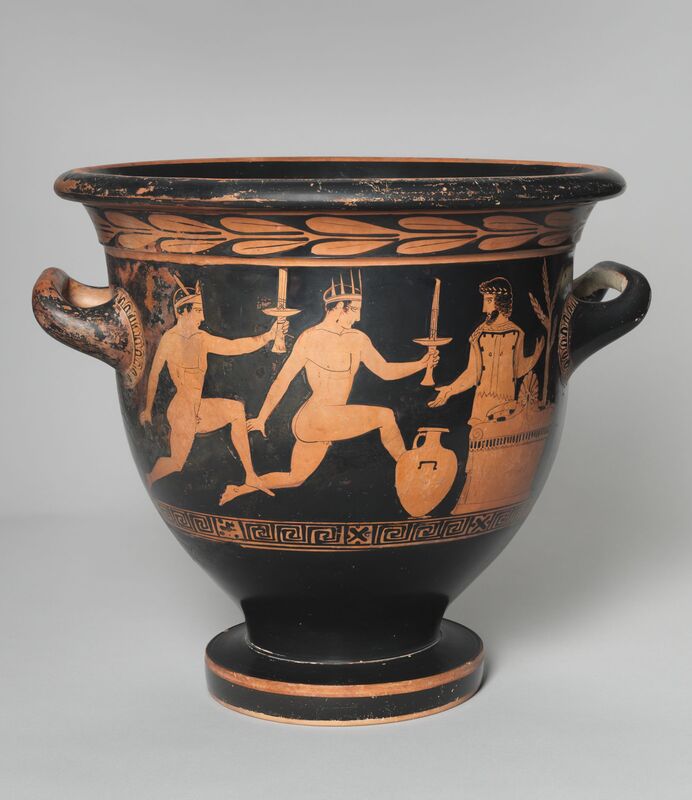Oliver Taplin has an exciting essay in the new issue of Arion in which he shows that tragic performances continued in Athens right through the devastating pandemic during the early years of the Peloponnesian war. You’d never guess that from the description Thucydides gives in the second book of his history of that war. He depicts near total devastation and demoralization.
Picture instead, or in addition, finding a place amid a crowd jostling into the old Theater of Dionysus (not the spacious Johnny-Come-Lately Theater of Herodes Atticus in use today) and experiencing Euripides’ Hippolytus. It’s spring 428. when the plague has ravaged the city and the funeral pyres are still stinking. Right off there’s vicious Aphrodite and the emvy-driven violence she unleashes, Phaedra, the step, with a sickness of her own (476 f.). And Theseus, the archetypical Athenian male, in blind rage cursing his innocent son, and Poseidon, destroying the lad.
And on and on the festival goes: Trilogy after trilogy, Three tragedies, three times with death all around us. Taplin suggests that the vicarious experience of the sufferings of others gave a kind of boost to their vital antibodies. He writes:
“This reinforcement is such that they can better cope with those grim eventualities of human life—those “fates”—that each and every one is bound to have to encounter in various ways and with various intensities sooner or later. This analo gy accommodates far better than catharsis the huge variety of events and sufferings that are encountered through tragedies, and of the re sponses to them “ p 40.
Maybe that’s right – being part of the performances of tragedies might help buck up spirits during a time of isolation, widespread misery and danger. But Taplin also points to the likelihood that Athens during its pandemic celebrated the whole Dionysia, comedies, satyr plays, dithyrambs and, presumably, the drunken, licentious romp. the komos, as well. It brings to mind Mardi Gras in Covid afflicted New Orleans during Covid in 2020 . (You can get a tame glimpse of it here..)
….. We must, then, seek out an explanation that reaches beyond the persistence of tragic performances. And that, in turn, raises an even broader question
What makes people want to celebrate under such circumstances, , dance in the streets, sing, gasp in horror and then belly laugh at comic absurdity, get drunk, wake up in strange beds – the whole Dionysiac experience? Is it a need to break out of isolation, smash boundaries .and give a collective finger to Death? ,
Picture instead, or in addition, finding a place amid a crowd jostling into the old Theater of Dionysus (not the spacious Johnny-Come-Lately Theater of Herodes Atticus in use today) and experiencing Euripides’ Hippolytus. It’s spring 428. when the plague has ravaged the city and the funeral pyres are still stinking. Right off there’s vicious Aphrodite and the emvy-driven violence she unleashes, Phaedra, the step, with a sickness of her own (476 f.). And Theseus, the archetypical Athenian male, in blind rage cursing his innocent son, and Poseidon, destroying the lad.
And on and on the festival goes: Trilogy after trilogy, Three tragedies, three times with death all around us. Taplin suggests that the vicarious experience of the sufferings of others gave a kind of boost to their vital antibodies. He writes:
“This reinforcement is such that they can better cope with those grim eventualities of human life—those “fates”—that each and every one is bound to have to encounter in various ways and with various intensities sooner or later. This analo gy accommodates far better than catharsis the huge variety of events and sufferings that are encountered through tragedies, and of the re sponses to them “ p 40.
Maybe that’s right – being part of the performances of tragedies might help buck up spirits during a time of isolation, widespread misery and danger. But Taplin also points to the likelihood that Athens during its pandemic celebrated the whole Dionysia, comedies, satyr plays, dithyrambs and, presumably, the drunken, licentious romp. the komos, as well. It brings to mind Mardi Gras in Covid afflicted New Orleans during Covid in 2020 . (You can get a tame glimpse of it here..)
….. We must, then, seek out an explanation that reaches beyond the persistence of tragic performances. And that, in turn, raises an even broader question
What makes people want to celebrate under such circumstances, , dance in the streets, sing, gasp in horror and then belly laugh at comic absurdity, get drunk, wake up in strange beds – the whole Dionysiac experience? Is it a need to break out of isolation, smash boundaries .and give a collective finger to Death? ,
